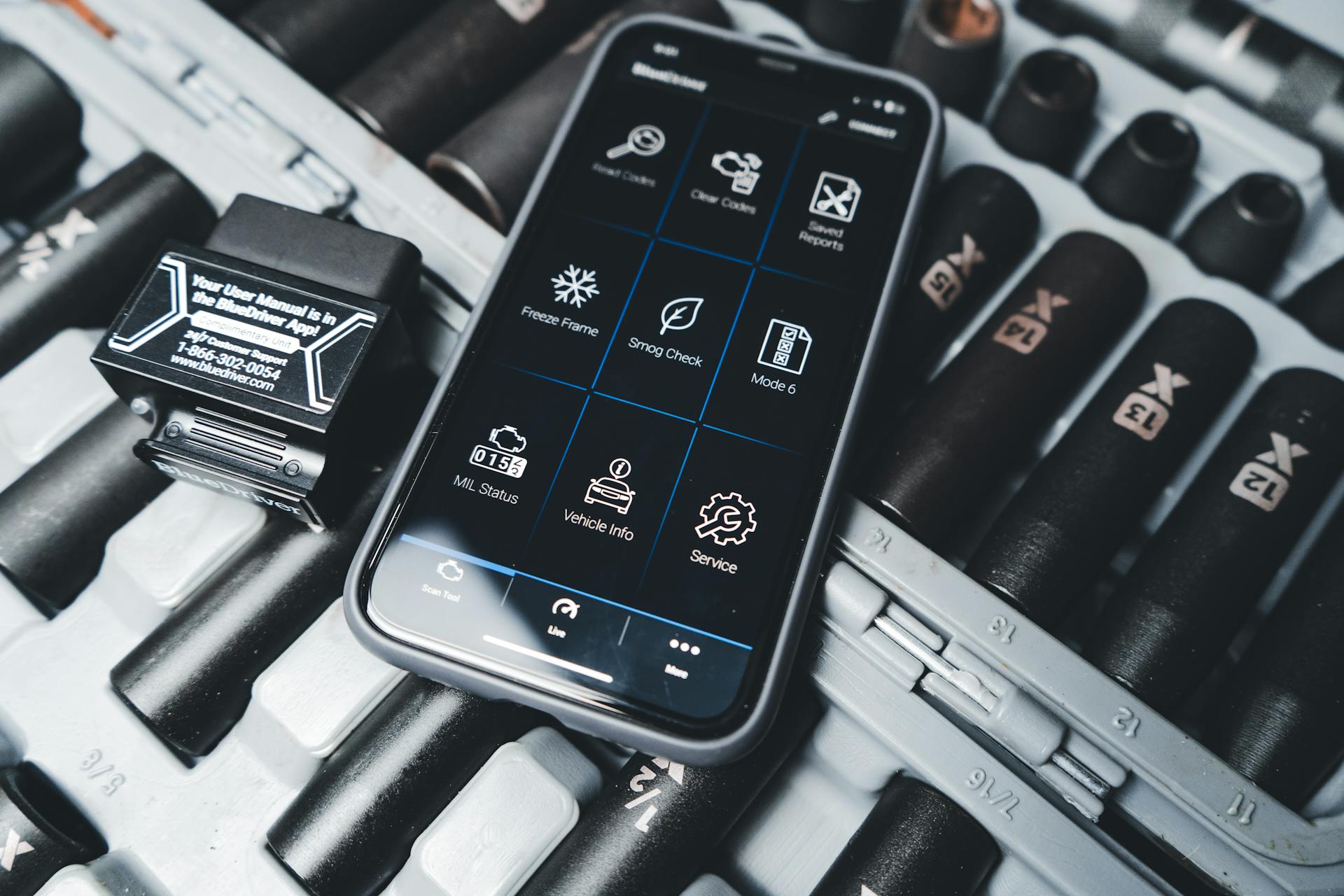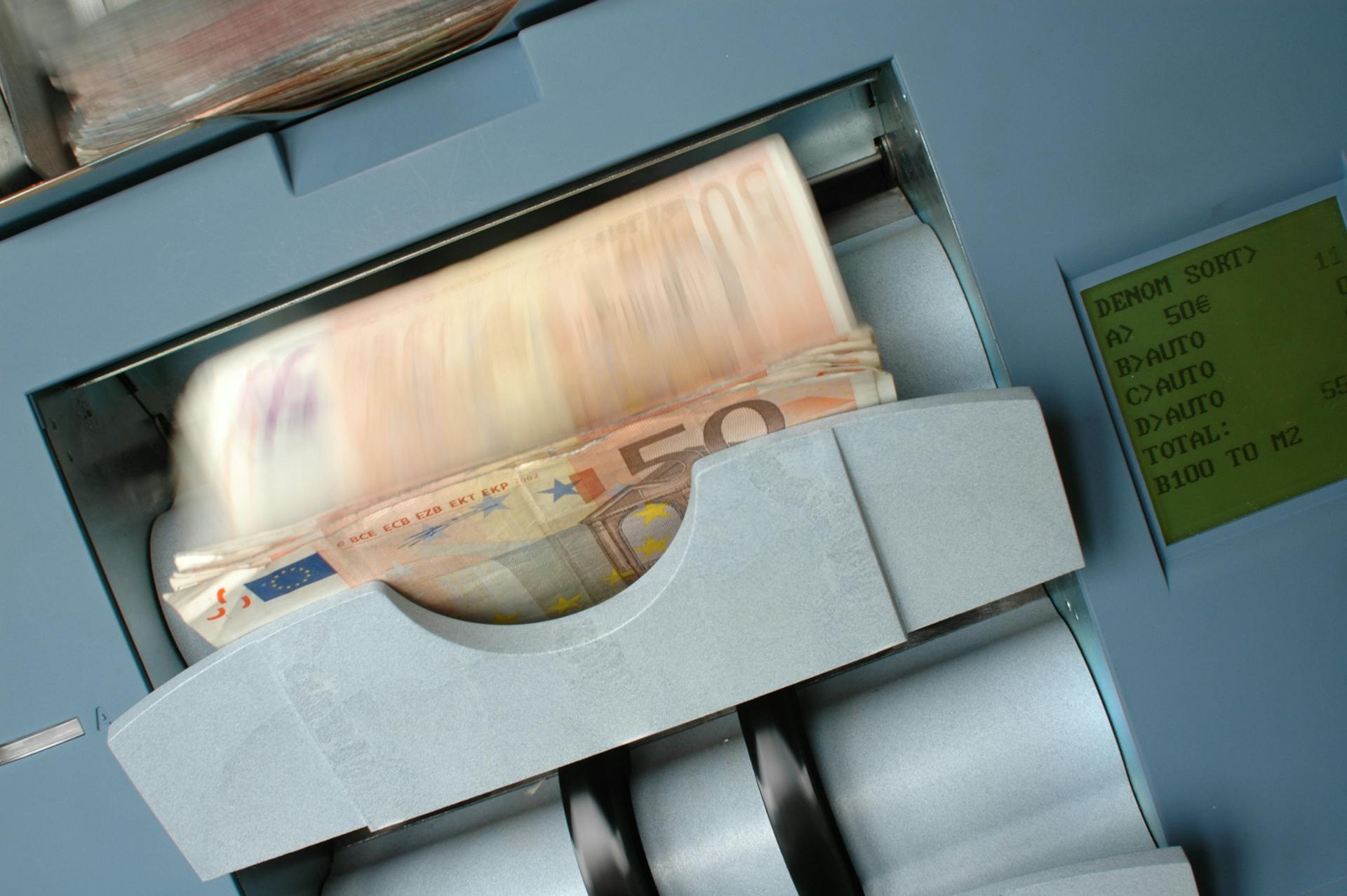
Electronic checks and wire transfers are two popular payment methods, but they have some key differences. An electronic check is a digital version of a traditional paper check, which can be sent electronically through the Automated Clearing House (ACH) network.
Electronic checks are often free or low-cost, and can take several days to process. They're also a good option for small transactions, like paying bills or sending money to a friend.
One of the main benefits of electronic checks is that they're secure, as they require a routing and account number to be processed.
How It Works
Electronic check and wire transfer are two popular methods for making payments, but have you ever wondered how they work? An ACH transaction, which includes electronic checks, has several moving parts and can depend on whether the transaction involves a direct payment or a debit.
In simple terms, the originator or first bank initiates an ACH transfer, which is grouped with other ACH transfers, and then processed through the clearing house. Once transfers are processed for the day, they’re sent in batches to the receiving bank, which credits or debits the appropriate accounts accordingly.
You might like: Ach vs Wire Transfer
ACH transfers can be known as or referred to as direct deposit, direct debit, check, EFT, and electronic bank transfer. This is because ACH transfers work by grouping transactions together and processing them in batches.
To initiate a wire transfer, you'll typically need to fill out a form with the sender and receiver's names, phone numbers, address, bank name, account information, and payment amount. The bank then processes the instructions and sends them to the recipient via a messaging system, such as Fedwire for domestic transfers and SWIFT for international transfers.
The receiving institution reviews the instructions and credits the payee with the designated amount. This process is usually faster than an ACH transfer, but comes with a fee.
Here's a comparison of the two:
Keep in mind that wire transfers can't be reversed once they're sent and accepted. This is why it's essential to double-check the recipient's information before initiating the transfer.
Key Differences Between Electronic Check and Wire Transfer
Electronic check and wire transfer are two popular methods for transferring funds, but they have some key differences. ACH transfers and wire transfers are both types of electronic funds transfers (EFTs).
One key difference between electronic check and wire transfer is the processing time. ACH transfers can take a couple of days to process, while wire transfers are faster.
Wire transfers, on the other hand, can be more expensive than ACH transfers. In fact, wire transfers are typically associated with a fee.
If you're looking for an alternative to ACH and wire transfers, you may want to consider peer-to-peer payment apps. These apps can be more convenient for certain transactions.
Here are some key differences between ACH and wire transfers:
Transaction Type and Speed
The ACH network is most commonly used for bill payments, sending money to friends, transferring money between your accounts, receiving direct deposits for your paycheck, government benefits, or tax refunds.

A wire transfer, on the other hand, is often used when working with tight deadlines or large amounts, such as with real estate transactions, car purchases, or federal tax payments. They're also used for international cash transfers.
Domestic wire transfers can be processed with money arriving the same day, sometimes in a few hours, but you must meet deadlines to benefit from same-day processing.
ACH transfers are typically scheduled between the following day and up to three days later, but same-day or almost immediate processing is also possible in some situations.
A unique perspective: Chime Receive Wire Transfers
What Is a Direct Debit Transaction?
A direct debit transaction is a type of ACH withdrawal that takes funds from accounts via either credit or debit. This process is used for paying bills, making the payment process easier for customers compared to writing a check.
Direct debit transactions can be automatic, meaning the customer doesn’t need to worry about receiving and paying a bill; it will be automatically transferred from their bank account.
Speed and Timing

Domestic wire transfers can be processed with money arriving the same day, sometimes in a few hours, if you meet deadlines, typically no later than 3 p.m. Eastern Time.
International wires can take longer to deliver, up to 7 to 10 days.
ACH transfers are typically scheduled between the following day and up to three days later, but same-day or almost immediate processing is also possible in some situations, with deadlines for sending money often later in the day and evening.
eChecks typically take three to five business days to process, done in batches to keep processing fees low.
Financial institutions can choose to have ACH credits processed and delivered within the same day, or in one to two business days, based on rules from the National Automated Clearing House Association.
Wire transfers send the funds along almost immediately through real-time processing, usually with no hold on funds received, so the recipient can access funds right away.
Recommended read: How Long Does Wiring Money Take Internationally
Cost and Fees

Electronic checks and wire transfers have different fee structures, which can impact your business's bottom line. ACH transfers, which include electronic checks, typically don't come with fees, except for a small fee of $5 if you get help placing the ACH over the phone versus online.
Fees for wire transfers are generally higher, with external domestic wire transfers costing between $25 and $30, and external international wire transfers costing between $35 and $50.
Here's a comparison of the fees associated with ACH transfers and wire transfers:
In contrast, eCheck processing fees can range from $0.30 to $1.50 per transaction, making them a cost-effective option for businesses.
What Is a Fund?
A fund is essentially a pool of money set aside for a specific purpose, like paying bills or covering unexpected expenses.
Most people think of funds as savings accounts, but in reality, funds can take many forms, including electronic funds transfers (EFTs) like ACH transfers and wire transfers.
See what others are reading: Bangladesh Electronic Funds Transfer Network

These EFTs are often used for one-time payments, like paying a bill or sending money to a friend.
Some funds, like those managed by banks, offer protection against unauthorized transactions under the Electronic Funds Transfer Act (EFTA).
However, not all EFTs are covered by the EFTA, such as wire transfers.
In fact, more than 9-in-10 Americans have used electronic payments, including EFTs, according to McKinsey & Co.
Here are some common types of EFTs:
- ACH transfers
- Wire transfers
- Over-the-phone transactions
- ATM transactions
- Peer-to-peer (P2P) payments
- Debit card payments
These types of funds can be convenient and safe, but it's essential to understand the rules and regulations surrounding them.
Cost and Fees
ACH transfers are generally free, but you might be charged a $30-$35 NSF fee for insufficient funds. This fee is charged each attempt.
Fees for ACH transfers are typically lower than wire transfers. In fact, sending a wire transfer can come with high fees, ranging from $25 to $50 for external domestic transfers.
You might pay lower wire fees with credit unions and online banks, and some prestige bank accounts waive costs associated with wires. However, even with these exceptions, wire fees can add up quickly.
You might like: Wire Transfer Fees Regions Bank

The cost of processing an eCheck varies depending on the type of eCheck merchant account you have, but the average fee ranges from $0.30 to $1.50 per transaction.
For large purchases, electronic check payments are much more economical than credit cards for sellers. In fact, the median cost of initiating and receiving an ACH payment for businesses is between $0.26 and $0.50.
Here are some examples of wire transfer fees:
- External domestic wire transfers: $25-$30
- External international wire transfers: $35-$50
- Internal wire transfers: Free to $15
In contrast, ACH costs are generally lower, typically costing an average of one dollar per transaction, depending on transaction volume. Some businesses may have to pay a separate fee from $5 to $30 per month to use ACH for transferring money.
A different take: Electronic Transaction
Safety and Security
Electronic checks and wire transfers are both secure options, but they have some differences when it comes to safety and security.
ACH transfers are regulated and designed to prevent fraudulent transactions, making them a safer option than some other payment methods.
Unlike paper checks, you can never lose or misplace an eCheck, and bad actors can’t take them out of the mail or off of someone’s desk, which reduces the risk of theft.
Electronic checks are processed through the Federal Reserve-regulated ACH network, which means they must follow strict security protocols.
Funds can be reversed in cases of fraud or payment error with ACH transfers, which is a big advantage for senders.
Wire transfers have little disadvantage for the recipient, as the funds are accessible immediately.
However, wire transfers can be relatively easy to fake, so senders need to know and confirm the person or account the wire transfer is being sent to.
eChecks provide a digital record for tracking and reconciliation, which makes it easier to keep track of payments.
A unique perspective: National Electronic Funds Transfer
Benefits and Advantages
Electronic checks offer numerous benefits and advantages over traditional payment methods. They are cheaper to process than paper checks and credit cards, with median costs ranging from $0.26 to $0.50 for ACH payments, compared to $2.00 and $4.00 for paper checks.
One of the most significant advantages of eChecks is their faster processing times. They are processed faster than paper checks and don't require physical submission for deposit. This allows businesses to receive payments more quickly and efficiently.
eChecks also reduce chargebacks and create less manual AR work, freeing up staff to focus on more important tasks. Additionally, they expand market reach and are better for the environment. In fact, eChecks can be 10X less expensive than paper checks, and their fees are typically lower than credit and debit card fees.
Here are some of the key benefits of eChecks:
- eChecks are cheaper to process
- eChecks have faster processing times
- eChecks reduce chargebacks
- eChecks create less manual AR work
- eChecks expand market reach
- eChecks are better for the environment
- eChecks provide better CX
- eChecks facilitate regulatory compliance
- eChecks make recurring payments easier
eChecks also provide extra layers of safety, including authorization, digital signature, duplicate detection, encryption, and certificate authorities. These features make them ideal payment options for sellers and buyers alike, giving businesses greater peace of mind.
Fees and Charges
Fees and Charges can be a major concern when it comes to electronic check and wire transfer options. Your bank may charge a $30-$35 NSF fee for insufficient funds, which is charged each attempt.
Standard fees for ACH transfers are relatively low, but you may still incur costs. You may be charged a small fee, such as $5, if you get help placing the ACH over the phone versus online.
Wire transfers, on the other hand, tend to come with high fees. Here's a comparison of wire transfer fees:
- External domestic wire transfers: Between $25 and $30
- External international wire transfers: Between $35 and $50
- Internal wire transfers (money coming to you): Free to $15
Some banks and credit unions may offer lower wire fees or waive costs associated with wires, but it's worth shopping around to compare rates.
Common Challenges and Solutions
Electronic checks and wire transfers have their own set of challenges.
One common challenge with electronic checks is the risk of NSF (non-sufficient funds) fees, which can be costly for both the sender and the recipient. NSF fees can range from $20 to $40 per occurrence.
Another challenge is the time it takes for funds to clear, which can take up to 5 business days. This can cause delays in payment processing and may not be suitable for urgent transactions.
If this caught your attention, see: Electronic Funds Transfer
Wire transfers, on the other hand, are generally faster, with funds available in as little as 1-2 business days. However, they can be more expensive, with fees ranging from $10 to $30 per transfer.
Security is also a concern, as wire transfers can be vulnerable to scams and identity theft if the recipient's account information is compromised.
Global Differences and Considerations
If you're sending money internationally, wire transfers are a more viable option, with a mature network of correspondent banks allowing transfers across countries and currencies with usually only one or two intermediary stops.
Wire transfers can be quite costly, with currency exchange fees ranging from 2-3%. I've seen friends pay these fees when sending money to family abroad, which can be a significant expense.
ACH transfers, on the other hand, are largely limited to the US, and even then, there have been occasional pushes for more interoperability between major ACH-like networks globally. The number of parties required to coordinate this is quite high, which is a significant barrier to wider adoption.
If you're sending money within the US, ACH transfers are a more affordable option, but if you need to send money internationally, wire transfers are the way to go.
You might enjoy: Wire Money Abroad
Frequently Asked Questions
Should I use an electronic or wire routing number?
For one-off transactions, consider using a wire transfer with a higher fee. For recurring payments or credits, an ACH transaction with lower fees may be a better option.
Is EFT the same as ACH or wire transfer?
EFT (Electronic Funds Transfer) is a broader term that includes ACH (Automated Clearing House) transfers, but not wire transfers. ACH transfers are a type of EFT, processed in batches, whereas wire transfers are processed individually in real-time.
Sources
- https://www.investopedia.com/ach-vs-wire-transfer-5208168
- https://www.osc.nc.gov/state-agency-resources/statewide-electronic-commerce-program-secp/electronic-funds-transfer-eft
- https://www.versapay.com/resources/what-are-echecks-benefits-accepting-echecks-b2b-businesses
- https://www.bankrate.com/banking/ach-eft-wire/
- https://www.ir.com/guides/ach-vs-wire-transfer
Featured Images: pexels.com


